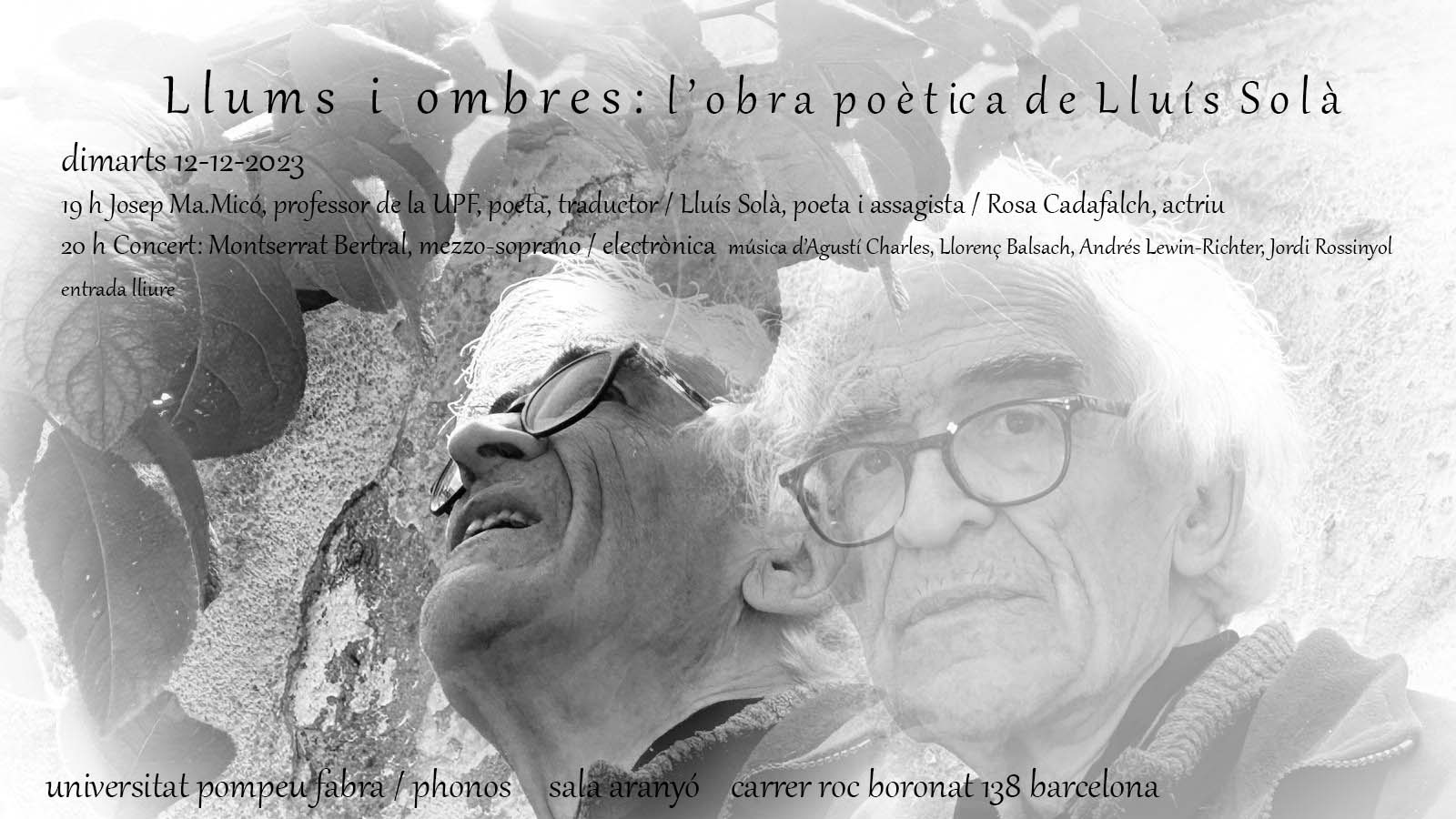Llums i ombres : l'obra poètica de Lluís Solà
Tuesday, December 12th 2023 at 19h. Sala Aranyó (UPF Campus Poblenou)

Llums i ombres : l'obra poètica de Lluís Solà
19h José Maria Micó, poet and translator, professor at the UPF
Lluís Solà, poet and essayist
Rosa Cadafalch, actress
20h Concert de Montserrat Bertral, mezzo-soprano
electronics: Pablo Fredes
Programa
Per les escletxes: Jordi Rossinyol from Cinc sonets de la llum
Cinc cançons sobre poemes de Lluís Solà: Llorenç Balsach
És pura l'aigua / Immòbil / Dansa la flama / Boca contra la boca / Immòbils a la riba
Tres cançons sobre textos de Lluís Solà: Andrés Lewin-Richter
Volta volta / Entre bellesa i dolor / No et paris
Boscos de llum i foscor: Agustí Charles
Alè sobre alè / Llum ajaguda / I ve la nit
About the program
Montserrat Bertral Ribas. With a degree in Art History, studies piano with Anna Fernández Recasens, singing with Estrella Estévez, Montserrat Aparici and Mercè Baiget,early music with Cristina Miatello (graduated in Baroque Music). She regularly collaborates with Gent Collegium Vocale under the direction of Philippe Herreweghe. She has participated in shows directed by Quim Lecina, Teatre Romea... She has participated productions at the Liceu, Auditori, Palau de la Música, Auditorio Nacional, Festival de Peralada, Festival de Música Antigua de Daroca, Festival de Música Religiosa de Cuenca, Teatre Lliure, Festival Shakespeare, Festival de Teatro de Almagro, Festival de Teatre de Tàrrega, Edinburgh Festival, Festival d’Òpera de Butxaca, Teatre Romea. She has recorded with Gent Collegium Vocale and Los Músicos de su Alteza(Seville Baroque Orchestra).
Lluís Solà (Vic, 1940) Was a founding member and director of the poetry magazine Reduccions (1977). He founded and directed the Centre d’Osona de l’Institut del Teatre and the Centre dramàtic d’Osona. He is an author and theater director. He has directed works by Brossa, Strindberg, Aeschylus, Yusaki Zeami... He has also directed poetry shows by Verdaguer, Bartra, Bauçà, Riba, Vinyoli... He has published La paraula i el món, essays on various Catalan poets, and studies on Catalan and foreign authors. He has translated texts by Kafka, Dürrenmatt, Beckett, Handke, Pound, Ungaretti, Rimbaud, Pessoa... He has published the volumes of poetic work De veu en veu, L'arbre constant, Al llindar de l'ara, Entre bellessa i dolor and Poesia completa. Premi Cavall Verd Price and Premi Nacional de la Crítica. This year he published Llibertat i sentit, Reflexions sobre la condició humana.
Llorenç Balsach, (Sabadell.1953). He studied music at the conservatories of Sabadell and Barcelona, at the Escola d'Estudis Musicals de Vallvidrera, at the Phonos studio and private lessons with the composer Josep Soler. He has also studied Mathematics at the Barcelona Autonomous University. His music has been performed in some European countries, Asia and America.Most of his works can be found in several recordings including five monographic records.He combines composition and research on the analysis and Music fundamentals.
Agustí Charles. Author of music for various formations. He has been awarded commissions and numerous awards for composition from national and international institutions. He has edited four CDs, in addition to other recordings. He has premiered six operas (Darsmtadt, Teatre del Liceu, Palau de la Música...). Numerous theoretical volumes published. Doctor in Art History, has been professor of Composition (C.S.M. de Aragón) and professor at ESMUC. He teaches orchestration at the E.S.M. Reina Sofía.
Andrés Lewin-Richter (Miranda de Ebro, 1937) founder and for many years executive director of Phonos, organiser of the ISCM 2005 and SMC 2010 events, was a professor at UPF and ESMUC. He is a composer specialising, to a greater extent, in electroacoustic music, having composed instrumental works on tape and music for ballet, theatre, film and video.
Jordi Rossinyol. Compositions and curriculum accessible at: < www: jordi rossinyol composer > Training with Gabriel Brncic and courses with Luigi Nono, among others. Attended Darmstadt in 1986. Projects with: Guinjoan, Mestres Quadreny, Padrós, Anna Ricci... Director of Vol ad Libitum (participating musicians and composers such as Nuix, Brncic, Padrós, Carles Riera, Ronald Lloyd, Néstor Eidler.. .) He has directed several chamber operas (with singers such as Josep Pieres, Marisa Martins, Montserrat Bertral...)
Collaborations in the poetic and literary field with Joan Brossa, Albert Mestres, Lluís Solà.
Rosa Cadafalch trained at the Institut del Teatre de Barcelona. Her career has developed mainly in the theatre, where she has been directed by, among others, Josep M. Flotats, Lourdes Barba, Hermann Bonnin, Jordi Mesalles, Calixte Bieito, Sergi Belbel, Joan Ollé, Núria Candela, Carlota Subirós. He has also participated in readings and recitals by authors such as Montserrat Abelló and Jacint Verdaguer, and in television and film series.
José María Micó (Barcelona, 1961) is a poet, musician and translator. Professor of Spanish literature at Universitat Pompeu Fabra, his most recent books are Primeras voluntades and De Dante a Borges. Classics pages (both in Acantilado, 2020 and 2023). He has translated into Spanish Catalan and Italian authors such as Ramon Llull, Dante, Petrarca, Jordi de Sant Jordi, Ausiàs March, Ludovico Ariosto and several contemporary poets. Throughout his career, he has won awards for literature (Hiperión and Generación del 27), translation (Premio Nacional de Traducción in Spain, and Italy, Diego Valeri Award, Ángel Crespo Award) and research (ICREA/Academia), some acknowledgments to the whole of his work. In recent years he has started a musical activity, and as part of the duo Marta i Micó he has recorded four albums.
Per les escletxes (Rossinyol)
To compose this piece I used two types of sounds, the sung (or recited) text and the transformed voice. First, from a block of graphics, Montserrat Bertral made a magnificent recording; graphics that started from a word, a sentence, and followed the entire text of the sonnets. The result was very interesting, an essential step in the composition. Both in monodic or polyphonic singing and in transformed sounds, words, or even phonemes, were often lost: the literalness faded while the meaning was preserved. We were faced with an impossible task (that melting text and music) and yet, given that the intention that drives the poet and the composer is the same, the task is appreciated. Through the cracks we refer to the open space in which we find ourselves when we start the imaginary conjunction between a poetic text and musical media, which are of another register. A space that is open to interpretation: the wetlands, a place where fresh water meets the sea. It is the space that verifies the difference in areas, the mixture of distance and encounter. The sounds, constructed and classified, are ordered following the text (in an illusory approximation to his speech) unrecognizable. Following the words, the musical form emerges, autonomously.
Cinc cançons sobre poemes de Lluís Solà (Balsach)
These are five small musical pieces for solo voice based on five poems by Lluís Solà.
És pura l'aigua
Basically only four notes are used in this piece, which are also four harmonics of the first note that sounds (do, sol, re, si). Only a chromatic note is used for a short time, which highlights the purity of the others.
Immòbil
In this poem I hear waves of the sea sliding on the sand, so the music tries to imitate the waves with groups of notes that grow, rise and fall following the rhythm of the waves. The voice register is very similar for each musical wave, but there are never exactly the same notes, only slight variations, like the sound of the sea on the sand.
Dansa la flama
This piece contrasts with the previous ones, as it has an air of dance; a more reckless and theatrical piece, trying to describe the lyrics.
Boca contra la boca and Immòbils a la riba
They show my musical vision of the poems, more musically abstract than the previous three, although the motifs and rhythms also try to describe the text, sometimes literally.
Three songs on texts by Lluis Solà (Lewin-Richter), it was based on an idea by Jordi Rossinyol for the mezzo-soprano Montserrat Bertral, which has been worked on for more than a year. My principle is maximum clarity in the expression of the text and that it should be adapted to the best possibilities of the performer, thus enriching the result: the singer has a maximum degree of freedom to express the text, making it her own. The electronics in this case is a reinforcement of the expressiveness and/or an accompaniment that is not contrapuntal but ambient using vocal fragments of the performer herself.
Boscos de llum foscor (Charles) is part of the series of pieces for voice, composed by the author called Cants. These Cants behave as a micro-melodrama for solo female voice (mezzo-soprano), where the singer dialogues with herself within an imaginary world that struggles between silence and word, light and darkness, and day and night. The poems chosen by Lluís Solà are arranged to create a dramatic game when the electronics become the wild environment that surrounds the voice, who in turn, and by means of sensors that she wears as a bracelet on her arms, interacts and modifies her own voice creating an infinite dialogue throughout the three pieces: I. Alè sobre alè; II. Llum ajaguda; III. I ve la nit; where the magic of words will be unreachable.
Supported by:

